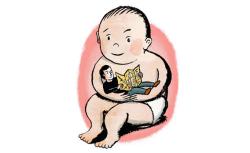For the modern overworked parent, a child’s independence is a double-edged sword. My preschooler can play happily in his room during rest time because he’s independent. And I, in my harried, half-time househusband capacity, am deeply grateful for this. But his room looks like a disaster after he plays in it—possibly because he’s independent. I’m less grateful for this.
I have incompatible desires. I didn’t realize they were incompatible until I read the work of the German psychologist Heidi Keller. Yesterday I discussed her research on how early parenting styles affect the speed of self-recognition. She’s also conducted experiments on how these styles of interaction affect self-regulation—specifically, how children comply with the expectations of others. Have they internalized the rule that toys having to be put away after rest time? (Just for example!) Or do they need to be constantly reminded of it—if they pay any attention to it at all? Are they capable of delaying gratification?
You can’t test for this in infancy. Self-regulation develops slowly—it simply doesn’t exist at 6 months or even a year. So Keller tested toddlers, around a year and a half of age. They were from very different societies—urban Greek, urban Costa Rican, rural Cameroonian Nso—each of which had a very different parenting style. The Greeks represented the typical Western style of dyadic, eye-to-eye interaction, with lots of object stimulation. (The baby plays with toys as much as people.) The Nso represented a more communal style of engagement, with lots of skin-to-skin contact but less eye-to-eye contact. The Costa Ricans were somewhere in between. The mirror self-recognition that Keller had documented with Nso and German children held up: The Greek toddlers recognized themselves at the youngest age, followed by the Costa Rican children and finally the Nso.
But then the toddlers were tested on their self-regulation capacity, not their self-recognition capacity. And here the results were very different. Each toddler was graded on how they responded to maternal requests (bring me this, put this away) and whether they could comply with a prohibition from the experimenter (the toddlers were given a treat in a clear container—but asked not to eat it until the experimenter, who’d left the room after giving it, returned).
The Nso, who’d been so slow to see themselves in the mirror, were far more successful here. Without being reminded, they complied with each task. The Costa Ricans were a bit worse at both tasks. The Greek children were far worse.
These results correlate precisely with parenting styles, Keller argues. The Greek, or Western, parenting style emphasizes autonomy; the Nso emphasizes interdependence. Implicitly, the Greek children had been taught since infancy that they were free agents in the world—and so naturally, when they were given orders, they weren’t very good at following them. (You talking to me?) The Nso, on the other hand, had been taught since infancy that they, effectively, weren’t free agents. Instead, they were part of a collective culture—and so naturally, when they were given orders, they were able to follow them far more easily. Following orders made intuitive sense.
Few things are quite this clear-cut, as Keller herself would say—the line between independence and interdependence is shaded, not bright. But different cultural parenting styles, even very early in infancy, do seem to be predictive of later behavior. That’s even though the cultural values embedded in these styles are never explicit. They’re never articulated. They don’t have to be. It’s all there in the way they, and we, hold and gaze at and play with our babies.
***
Nicholas Day’s book on the science and history of infancy, Baby Meets World, from which part of this post was taken, was just published. His website is nicholasday.net. He is @nicksday on Twitter.
